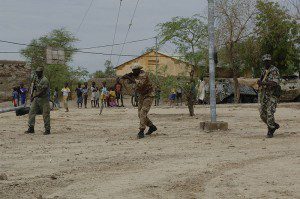Quite a weekend, the opening of Zero Dark Thirty in the U.S. reminding everyone of the interventionist elements of the Obama Doctrine (see my next post) and a full-fledged French intervention in Mali, not to mention U.S. assistance with a French hostage liberation operation tucked away on the inside pages.
Washington, D.C. is a funny place these days…all but two of the think tanks here are obsessed with the rise of China and just about the entire U.S. foreign policy establishment is choking on economic austerity and therefore fully inclined to doubt that our government or any other can afford much in the way of armed interventions these days.
And voila, the erstwhile wishy-washy Francois Hollande says “And me, not just Sarkozy” with across the board support from both French public opinion and Malian public opinion, plus that of the UK and U.S. governments. The same set of circumstances framed the successful U.S.-European intervention in Libya just over a year ago. Only since then, the vast majority of foreign policy thinkers/commentators have predicted a one-way direction for Western troops (out of Iraq and Afghanistan and back to their barracks).
When I recently left the U.S. government I had a Truman Show type experience, having worked with government colleagues who were sanguine about not only the Libyan operation but potentially others to follow. However, immediately upon leaving I discovered everyone else in DC had written off Europe entirely, determined that the Muslim Brotherhood was evil incarnate, and devoted itself to fiscal cliff navel gazing. In my first government meeting as a private citizen again, I found myself arguing to a high ranking army officer that “Far sooner then China will ever even think of taking us on militarily or even attacking Taiwan, the West will intervene again.” To my surprise, he replied: “Can I use that line?”
Personally I am right down this middle on the question of whether the current era will later be deemed the era of austerity or the dawn of the age of interventionism. Much like the Obama Doctrine, which I define very simply as robust burden sharing, I think each case will represent a different matrix of national security calculations and any decisions will be made with a full consideration of not only our interests but also our limitations, economic included.
France is doing pretty much the same thing. And you know what, I gotta hand it to them. They made a successful intervention in the Ivory Coast that got very little attention here, and unlike Americans the French people are not as averse to operations that go awry. Whereas we are simultaneously inured to the long death tolls in our current wars yet hyper sensitive about losing anyone on short term operations, the French also intervened over the weekend (with our help) to rescue a hostage in Somalia. The hostage died, as well as two French soldiers, yet the French public is solidly in support of Hollande’s larger intervention in Mali.
Can you imagine the political hell to pay if President Obama’s rendezvous with Dark Thirty destiny had gone awry, with the loss of not only an expensive aircraft but also half or more of Seal Team 6 (and no OBL in a body bag)? The prospect makes me think of a Jimmy Carter style ignominious defeat at the presidential ballot box. I still marvel at the War in Kosovo or whatever historians have taken to calling it: the first war in America’s history with zero casualties.
As for austerity vs. interventionism, we are now looking at a kind of present day global political experiment: will the coming era of multipolarity be marked by an aversion to intervene or will a more unstable world occasionally threaten the interests of the poles to the point of warranting an intervention now and then?
Dr. Jeffrey A. Stacey is currently Managing Partner of Geopolicity USA, an overseas development firm. Formerly he was Senior Fellow at the Center for Transatlantic Relations at SAIS, before which he served in the Obama Administration as a State Department official specializing in NATO and EU relations at the Bureau for Conflict Stabilization Operations. At State he founded and managed the International Stabilization and Peacebuilding Initiative (ISPI), which has over 20 government and international organization partners.
Dr. Stacey is the author of "Integrating Europe" by Oxford University Press and is currently working on a follow-up book entitled "End of the West, Rise of the East?" He has been a guest blogger at The Washington Note and Democracy Arsenal, a professor of U.S. foreign policy at Tulane University and Fordham University, a consultant at the Open Society Institute and the U.S. Institute of Peace, and a visiting scholar at George Washington, Georgetown, and the University of California. He received his PhD from Columbia University.



There’s a connection betw. Libya and Mali you didn’t mention: Tuaregs who fought on Gaddafi’s side came away with weapons which they used in their effort to take over (for lack of a better word) n. Mali. Though according to one news report I heard, the Tuaregs are now not happy w the Islamist forces (who do seem quite extreme) against whom the French and Malian govt. are fighting.
As for the war in Kosovo, a main reason it had zero combat casualties on the U.S. side was that US/NATO planes bombed from 15,000 feet, ensuring pilots’ safety at the expense of more civilian casualties. In a report issued in 2000, Amnesty Int’l argued that NATO had committed “serious violations of the laws of war.”